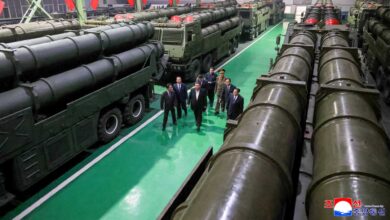President Kim Il Sung, whom the Korean people acclaimed for the first time in their history spanning 5 000 years, was the father of the Korean nation and the founding father of socialist Korea.
He was born in a modest, straw-thatched house at Mangyongdae in Pyongyang on April 15, Juche 1 (1912).
At that time Korea was turned into a living hell as it was placed under the military occupation of the Japanese imperialists. Patriotic figures, who failed to realize their high ambition of liberating Korea, lamented bitterly over their ruined nation. As they were deprived of their mother tongue by the Japanese imperialists, they dispersed to go to alien lands in search of a means of survival.
The Korean people waited for the advent of a leader who could save their country. At this juncture, Kim Il Sung formed the Down-with-Imperialism Union on October 17, 1926 and declared a fresh start of the Korean revolution. Then he rallied the broad sections of people including workers, peasants and youth and students and roused them to the anti-Japanese patriotic struggle.
He authored the immortal Juche idea that one must carry out the revolution independently and creatively on one’s own responsibility, casting a fresh light on the road ahead of the Korean revolution.
He was the Sun who provided sustenance for the Korean people to revive their soul stained with tears of blood and disgrace of a ruined nation.
Young Korean communists held him up in the highest esteem by singing the song Star of Korea in praise of him who would shed bright light on the land of 3 000 ri like a bright star in the sky of their country. They regarded him as the saviour of Korea and the Sun of its nation.
By leading the 20-year-long anti-Japanese revolution to victory, he achieved Korea’s liberation. When he first met with the Korean people on October 14, 1945, he called on all of them to build a prosperous country with those with strength giving strength, those with knowledge offering knowledge and those with money donating money.
Poet Ri Chan praised General Kim Il Sung as the light and the Sun of the Korean people, and the Korean people turned out in the effort to build a new Korea true to his idea of building a prosperous country, shouting “Long live General Kim Il Sung, the Sun of the Nation”.
But the nascent DPRK had to undergo trials again owing to the armed invasion of the enemies. However, under the leadership of Kim Il Sung, the Korean people won victory in the three-year-long Fatherland Liberation War and defended with honour the freedom and independence of their country. And they built socialist Korea on the debris of the war and ushered in a new history of creations and changes.
He devoted all his life to protecting the cradle of their independent life and providing them with more cultured and happy life.
Regarding “The people are God” as his lifetime motto, Kim Il Sung always went among the people and sat knee to knee with them discussing their livelihood. He ensured that their aspirations and demands were reflected in the policies and realized.
Always on the road of field guidance, rain or shine, he visited every part of the country, be it a factory or rural village, lowland or mountainous area.
Having embarked on the road of revolution in his teens, he achieved the cause of nation building in his thirties, firmly safeguarded the sovereignty and dignity of the country and developed the DPRK into a people-centred socialist state through his energetic activities as the head of state for nearly half a century. Indeed, it is not fortuitous that the Korean people hold him in the highest esteem, regarding him as the Sun of their nation and the eternal image of the DPRK.
That is why they convey his exploits for all ages, calling their country and nation Kim Il Sung’s Korea and Kim Il Sung’s nation.
After his demise on July 8, 1994, they renovated the Kumsusan Assembly Hall, his residential office, into the Kumsusan Memorial Palace (The present Kumsusan Palace of the Sun) and preserved him there in his lifetime appearance. And they instituted the Juche era with 1912, when Kim Il Sung was born, as the first year and designated April 15, the date of his birth, as the Day of the Sun and the greatest national holiday. In addition, they, by adopting a law, proclaimed that he would be held up in the highest esteem as the eternal President of the DPRK.
As he adorned his sacred revolutionary career with lofty ideals and boundless devotion, Kim Il Sung still remains etched in the hearts of the Korean people as their eternal Sun.

